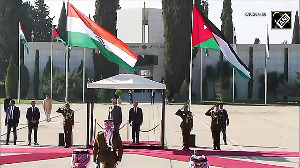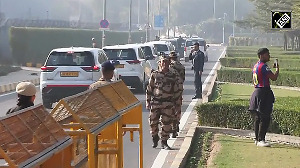As the Indo-US nuclear deal faced new hurdles, a leading American daily on Monday said the pact was in 'trouble' because it did not take lawmakers into confidence from the outset.
Complete Coverage: Indo-US Nuclear Tango
Close on the heels of some lawmakers of the India Caucus opposing the landmark deal, a section of American scientists, known for their anti-nuclear weapons stance, have said that the pact was bad for the long-term security interests of the US, India and the world.
In a lengthy piece tracing the origins of the deal and the final moments leading to its actual announcement last July, the Washington Post said it was in trouble partly because -- in what some critics say was an echo of the Iraq invasion -- there was little consultation with the Congress or within the foreign-affairs bureaucracy before it was announced."
"Last month in New Delhi, US President George W Bush and Prime Minister Manmohan Singh reached an agreement on how India will implement the deal. But nuclear specialists in the US government say their concerns about weapons proliferation also were overridden in final talks," the Post said.
It said it was only after the announcement that the Bush administration began briefing members of Congress and in the process created lasting problems.
"The way they (Bush administration) jammed it through is going to haunt us," an unnamed senior official was quoted in the daily as saying.
The Post said, the leading concerns or check lists of the top non proliferation officials like Robert Joseph and John Rood of the State Department never really made it to the final list as officials who were eager to clinch the deal with India took them off.
"We never even got to the stage where we could negotiate them," a senior official told the daily.
Rood, according to the report, made forceful presentations to the Under Secretary of State for Political Affairs Nicholas Burns on some of the non-proliferation concerns that are now being raised in Congress, the non-proliferation think tanks and the scientific community.
"Without a limit on fissile material production, the deal could allow India to make many more weapons than it needed. There was also concern about rewarding a country that built nuclear weapons in secret, which North Korea and Iran are accused of doing. Some in the administration said the deal would hurt US efforts to pressure those countries on their programs," it said.
And then the revelation that India was demanding until the last minute that Washington recognise the country as a nuclear weapons state. "They were really demanding that we recognize them as a weapons state," a senior official who was knowledgeable about the discussions told the newspaper.
"Thank God we said no to that, but they almost got it. The Indians were incredibly greedy that day. They were getting 99 per cent of what they asked for and still they pushed for 100," the official said.
Meanwhile, the Federation of American Scientists has said that it was clearly opposed to the legislation.
"The agreement with India is contrary to the long-term security of the United States, India and the world," FAS, which is endorsed by 67 Nobel Laureates, said in a petition circulated to its members and associates on March 27.
Urging its members to sign the petition and write to their local Congressmen and Senators, the advisory said the ongoing process to introduce a bill in the Congress to give effect to the pact will circumvent future Congressional review and weaken international non-proliferation efforts.
"The Bush administration has submitted a bill to Congress, HR 4974, which revokes Congressional review and evaluation of any future nuclear trade deal with India. We need your help to defeat this legislation."
The FAS, established in 1945 by scientists associated with the Manhattan Project that built the first atom bomb, said, "Allowing India to bypass the Non-proliferation Treaty weakens the entire international non-proliferation effort. While the NPT is not perfect, it should be strengthened, not undermined. Moreover, the United States cannot rightfully criticize India's nuclear program while at the same time developing a national security strategy that increases the emphasis on nuclear weapons."
"We believe that the United States should withhold nuclear cooperation from India and work vigorously with other nuclear powers to dramatically reduce the number and salience of nuclear weapons," it said.





